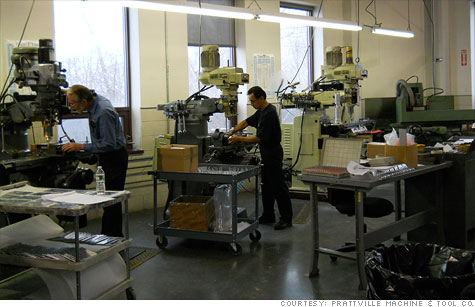Search News

Prattville Machine & Tool Company in Peabody, Mass., is one of many manufacturers that can't find skilled American workers and is turning to foreign workers to fill jobs.
NEW YORK (CNNMoney) -- U.S. manufacturers, frustrated by a shortage of skilled American factory workers, are going abroad to find them.
Business for factories has surged recently, creating a huge demand for machinists, tool and die makers, computer-controlled machine programmers and operators.
"These jobs are the backbone of manufacturing," said Gardner Carrick, senior director with the Manufacturing Institute. "These are good quality middle-class jobs that Americans should be training for."
The United States is experiencing a shrinking pipeline of manufacturing talent, said James Wall, deputy director of the National Institute for Metalworking Skills.
"It's been in the making for years," he said. Factories didn't feel the labor pinch as much when manufacturing was in a slump. But the latest "Made in USA" resurgence has them scrambling.
Wall said some manufacturers have been relying on foreign workers to fill the gaps through H-1B visas.
The popular H-1B program allows high-skilled foreign workers to be employed in the United States for a maximum duration of six years. Each year, the government issues a quota of new H-1B work visa applications, and all industries compete against the quota. Last year's cap was set at 65,000.
High-tech companies tend to submit the most applications for H-1B visas. Manufacturers typically aren't big users of the program. Out of all the H-1B applications sent to the Labor Department less than 10% were from manufacturers.
A total of 39,551 foreign workers for manufacturing positions were certified by the Labor Department in 2011 for H-1B visas.
That number was up from 34,830 workers in 2010.
The agency certifies an application after a U.S. employer has demonstrated that it was unable to find a willing and qualified American worker for the job.
The H-1B visa still needs to be approved by the State Department to be granted. So the number of issued H-1B visas could be much fewer than the number of approved applications.
A majority of the applications for manufacturing last year were for architecture, engineering and other non-production related jobs, said Carrick, analyzing Labor Department data.
Less than 100 certified applications were for core factory jobs, such as machinists and computer-controlled machine operators, he added.
So even though manufacturers are going down this path, "H-1B is never going to be the answer to the skills shortage in production jobs in manufacturing," he said.
"The H-1B certainly isn't the best long-term solution," said Carrick. "We have to grow this talent at home."
But don't tell that to Vincent Spinali, general manager with Prattville Machine & Tool Company. The Peabody, Mass.-based manufacturer with 100 employees is a machine shop whose clients are in the aerospace and defense industries.
Spinali said the company invested a year and a "significant amount of money" to bring back one of its former machinists from Colombia through the H-1B visa program.
"He was in the U.S. on political asylum. We hired him, trained him and he was with us for 15 years after that. He was a great worker," said Spinali.
In 2010, Spinali said the worker's status changed, and he was sent back to Colombia.
The company got the worker back six months ago. "We realized he had become invaluable to us, and it would be hard to replace someone with his experience quickly," said Spinali.
Spinali said the H-1B program is difficult to maneuver, time-consuming and expensive, but he would consider using it again to hire more workers.
"Our business has picked up," he said. "Also, half of our workers are over 50. It's going to be very difficult to replace them when they retire because there's a shortage of young skilled workers."
Meanwhile, the Labor Department is trying to discourage American manufacturers from using H-1B visas, by offering grants to manufacturing associations and companies that train and hire domestically.
The agency recently awarded the National Institute of Metalworking Skills a $2.2 million grant that will encourage members to start in-house apprenticeships.
"We can and should develop our own skilled production workforce through career and technical institutes," Carrickn said. "These schools can provide U.S. manufacturers with the reliable supply of skilled production workers that they so desperately need." ![]()